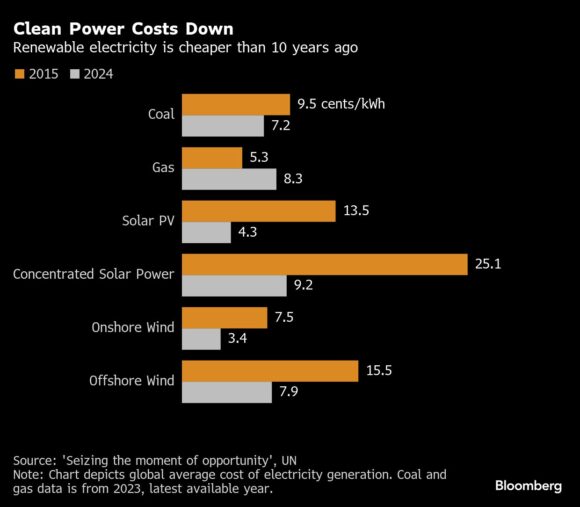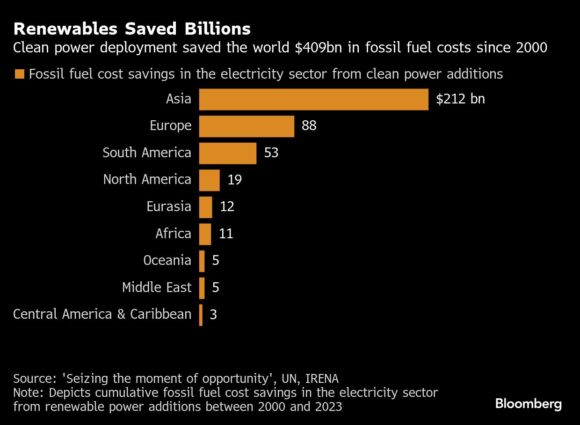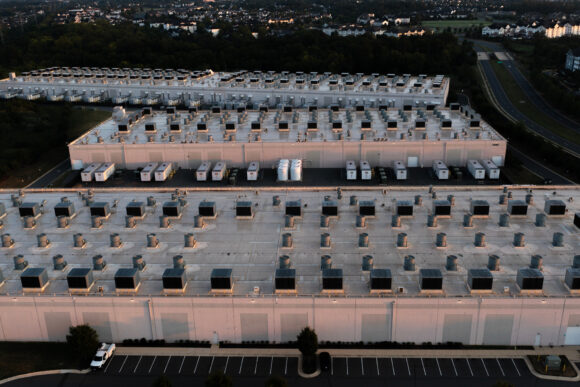Major tech firms should commit to fully powering data centers with renewable energy by 2030, said United Nations Secretary-General António Guterres.
Big tech also must be responsible in its use of water for cooling, Guterres said Tuesday in New York City as he presented the UN’s new report on the energy transition, “Seizing the Moment of Opportunity,” together with the International Renewable Energy Agency.
“AI can boost efficiency, innovation and resilience in energy systems, but it is also energy hungry,” Guterres said. “This is not sustainable — unless we make it so.”

A typical AI data center consumes as much power as 100,000 homes, according to the UN, and the largest centers now being built will use 20 times that. By 2030, data centers could consume as much electricity as all of Japan today, the report finds.
Although renewable energy is advancing exponentially across the world as costs fall, the transition away from fossil fuels is highly concentrated in advanced economies like the US and Europe, as well as China, the UN says. Much of the developing world is falling behind. That means clean energy is not replacing fossil energy at the pace and scale needed.
Emerging geopolitical risks — including tariffs — could raise clean-energy costs in the short term, the report says. Adding vast amounts of renewable capacity will also make grids more volatile, and addressing that could bump up costs for a time.
But long-term, the cost of clean power will continue to decline, the report predicts, as technology evolves and the supply chain matures.

The energy transition has reached a point of no return, Guterres said in his speech. “The clean energy future is no longer a promise, it’s a fact,” he said. “No government, no industry, no special interest can stop it.”
Over 90% of new renewable projects produce electricity for less than the cheapest fossil-fuel alternative, according to new data from the International Renewable Energy Agency. Some $2 trillion was invested in clean energy in 2024, the UN says — about $800 billion more than went into fossil fuels.
But clean power adoption remains deeply unequal. Africa made up just 1.5% of global investment in renewables last year, despite accounting for 85% of the world’s population without access to electricity. Less than one in every five dollars invested in clean power has gone to emerging markets outside China since the Paris Agreement came into force in 2016.

World leaders committed to try to limit global warming to 1.5C when they signed the Paris accord. A decade later, with that goal in grave peril, nations are due to present their new emissions plans ahead of the COP30 climate summit in Brazil in November.
Countries in the Group of 20 produce the bulk of emissions so must lead in ambition, Guterres said.
“The race for the new must not be a race for the few,” he said. “It must be a relay — shared, inclusive and resilient.”
Top photograph: An Amazon Web Services data center in Ashburn, Virginia, US, on Sunday, July 28, 2024. Data center developers in Northern Virginia are asking utility Dominion Energy Inc. for as much power as several nuclear reactors can generate, in the latest sign of how artificial intelligence is helping drive up electricity demand. Photo credit: Nathan Howard/Bloomberg
Topics Trends InsurTech Data Driven Artificial Intelligence Energy
Was this article valuable?
Here are more articles you may enjoy.



 Munich Re Unit to Cut 1,000 Positions as AI Takes Over Jobs
Munich Re Unit to Cut 1,000 Positions as AI Takes Over Jobs  Florida Regulators Crack the Whip on Auto Warranty Firm, Fake Certificates of Insurance
Florida Regulators Crack the Whip on Auto Warranty Firm, Fake Certificates of Insurance  AI Claim Assistant Now Taking Auto Damage Claims Calls at Travelers
AI Claim Assistant Now Taking Auto Damage Claims Calls at Travelers  Fla. Commissioner Offers Major Changes to Citizens’ Commercial Clearinghouse Plan
Fla. Commissioner Offers Major Changes to Citizens’ Commercial Clearinghouse Plan 

